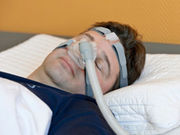But more study is needed, researchers say
WEDNESDAY, Jan. 6, 2016 (HealthDay News) — A new discovery about the way obstructive sleep apnea may raise the risk of cardiovascular disease also suggests that taking statins might reduce that risk. The findings were published in the Jan. 6 issue of Science Translational Medicine.
In the small, laboratory study, Sanja Jelic, M.D., an associate professor of medicine at the Columbia University Medical Center in New York City, and colleagues examined endothelial cells from 76 adults with obstructive sleep apnea and 52 adults without sleep apnea. The adults were similar in terms of body fat percentage, daytime sleepiness symptoms, blood pressure, and underlying health conditions.
The researchers found that the protein CD59, a major complement inhibitor that protects endothelial cells from the membrane attack complex, was implicated in the intermittent hypoxia of sleep apnea. In patients with sleep apnea, the protein was often inside the cells as opposed to on the surface in the controls. This increased internalization of endothelial CD59 appeared to be cholesterol-dependent and reversed by statins in a CD59-dependent manner.
“If the beneficial effects of statins on blood vessel health in patients with obstructive sleep apnea is confirmed in larger clinical trials, obstructive sleep apnea may become an indication for statin therapy,” Jelic told HealthDay. “Chronic inflammation of the blood vessels contributes to increased cardiovascular risk in patients with obstructive sleep apnea.”
Full Text (subscription or payment may be required)
Copyright © 2016 HealthDay. All rights reserved.








